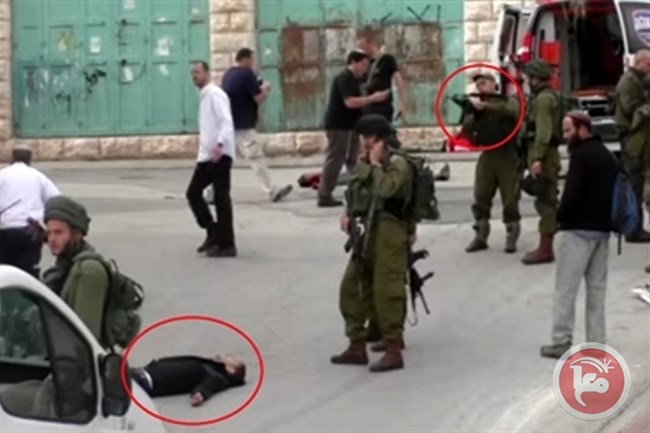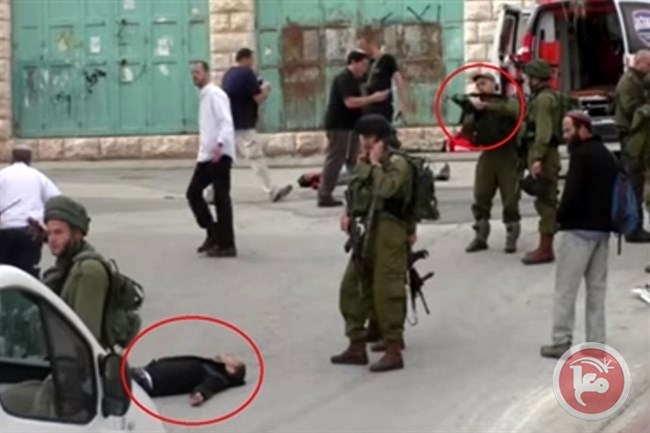Ma’aN News Agency | – –
BETHLEHEM (Ma’an) — After being found guilty of manslaughter for the filmed, execution-style shooting of 21-year-old Abd al-Fattah al-Sharif, 20-year-old Israeli soldier Elor Azarya was sentenced to 18 months in prison, a year’s probation, and a demotion in his military rank on Tuesday.
File
The prosecution had sought a three- to five-year prison sentence for the killing, with the maximum sentence for manslaughter being 20 years in prison.
The sentence was scheduled to begin on March 5, though Azarya’s defense team said it would submit an appeal to block the sentence, saying it had a “good chance” and “nothing to lose,” according to reports from Israeli media from inside the courtroom.
After al-Sharif and Ramzi Aziz al-Qasrawi, also 21, allegedly carried out a stabbing attack on another soldier in the southern occupied West Bank city of Hebron last March, al-Qasrawi was fatally shot, while al-Sharif was shot and left severely wounded on the ground for several minutes before Azarya stepped forward and shot him in the head, with a number of witnesses quoting him as saying “This dog is still alive” and “This terrorist deserves to die” before pulling the trigger.
Leading up to the announcement of the sentence, the panel of three judges weighed the “complexity” and “competing values” of the case; while they agreed that Azarya acted with the intent to kill and not because he felt threatened, a two-judge majority believed the “unique post-terror attack” atmosphere should work heavily in his favor.
Judges called for leniency due to the fact that it was Azarya’s first time in a “terror situation,” and also noted the alleged mismanagement of the scene by Israeli commanders at the scene, who later went on to give harsh testimonies against the young soldier.
The judges said that the prosecution had successfully argued that Azarya had failed to show regret throughout the trial, while Azarya also violated the so-called purity of arms value enshrined in the Israeli army’s ethical code.
They also said that the months Azarya has spent in open detention on an Israeli military base would not be deducted from his sentence, but would be taken into account “on some level.”
The lenient sentence came after judges gave a wholesale endorsement of the prosecution’s arguments against Azarya while refuting nearly every claim presented by the defense when he was convicted in January.
Members of al-Sharif’s family and Palestinian leadership have called the case a “show trial” for handing down a lenient manslaughter conviction for the soldier, while focusing on the case to distract from a wider culture of impunity for Israeli forces.
Following the announcement of the 18-month sentence, the family said they were “not surprised.”
Israeli daily Haaretz quoting them as saying: “from the onset we knew this was a show trial that will not do us justice. Even though the soldier was caught on video and it is clear that this is a cold blooded execution, he was convicted only of manslaughter, not murder, and the prosecution asked for only a light sentence of three years. The sentence he received is less than a Palestinian child gets for throwing stones.”
Al-Sharif’s family has vowed to take the case to the International Criminal Court.
PLO Executive Committee Member Hanan Ashrawi released a statement on Tuesday, slamming the sentence as a “travesty of justice.”
“It is apparent that the Israeli judicial system has become compromised with the systemic racism, injustice, and the culture of hate that is plaguing the Israeli occupation,” she wrote, adding that “This sentencing demonstrates the active devaluation of human life, especially the lives of Palestinians that have been oppressed and held captive by an Israeli occupation for far too long.”
Nevertheless, Azarya’s defense team has attempted to reverse the manslaughter charges deemed too harsh, while the young Israeli army medic has garnered widespread support among the Israeli public under a vocal and at times violent solidarity campaign that dubbed Azarya “everyone’s son.”
The Palestinian activist who captured the footage of the shooting has meanwhile received hundreds of death threats, and his house has been surrounded and attacked by Israeli settlers multiple times.
Some 67 percent of Israelis said they supported a presidential pardon for committing what has been branded an extrajudicial execution by the United Nations and rights groups.
On Tuesday, calls for a pardon were reiterated by Israeli Education Minister Naftali Bennett who said that “Israel’s security demands he be pardoned. Elor was sent to protect Israelis at the height of a wave of Palestinian terror attacks. He cannot go to jail or we will all pay the price.”
Israeli Culture Minister Miri Regev said it was a “sad” and “difficult” day, adding that “Elor should not sit a single day in prison beyond the time he has already served.”
Ashrawi in her statement said that the calls for a pardon by the right-wing Israeli ministers “reflects the true nature of this government that acts outside the most basic norms of justice, morality and judicial integrity.”
Other commentators have argued that the national debate in Israel over the case has laid bare a dim reality regarding where Israelis stand on the human rights of Palestinians.
Azarya is the only member of Israeli forces to be charged with killing a Palestinian in 2016 –when at least 109 Palestinians were shot and killed by Israeli forces and settlers — according to Human Rights Watch.
According to rights group Yesh Din, of the 186 criminal investigations opened by the Israeli army into suspected offenses against Palestinians in 2015, just four yielded indictments.
The last time an Israeli soldier was convicted of manslaughter took place in 2003, according to Times of Israel, when Taysir Heib shot and mortally wounded British activist and photographer Tom Hurndall in the Gaza Strip.
“This case was exceptional in its indictment as Israel usually doesn’t indict its soldiers even when evidence very clearly indicates a criminal offence,” General Director of human rights NGO Adalah, Hassan Jabareen said Tuesday.
“This case was, however, unexceptional in its minimal sentence, which reflects the widespread impunity enjoyed by Israeli security personnel accused — or even convicted in a court of law — of crimes against Palestinians. Azarya’s light sentence of 18 months is an expression of disregard for the value of Palestinian life and likewise fails to serve as a deterrent.”
Meanwhile, a report released by Human Rights Watch days before Azarya was convicted documented “numerous statements” made by senior Israeli politicians and religious figures “calling on police and soldiers to shoot to kill suspected attackers, irrespective of whether lethal force is actually strictly necessary to protect life.”
HRW noted that Israel’s shoot-to-kill policy has received widespread support among Israeli citizens, citing a 2016 poll by the Israel Democracy Institute which found that 47 percent of Jewish Israelis supported the sentiment that “any Palestinian who carries out a terror attack against Jews should be killed on the spot, even if he has been captured and clearly does not pose a threat.”




 © 2025 All Rights Reserved
© 2025 All Rights Reserved